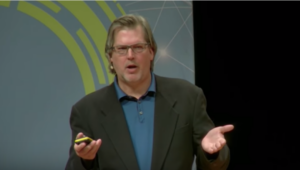“Silicon Dreams and Carbon Nightmares: The Wide Boundary Impacts of AI”. A hair-raising journey through developing dark futures. Bees, birds, and people as fodder for the system, while climate change is accelerated by corporate artificial intelligence. Dr. Nate Hagens is Director of The Institute for the Study of Energy & Our Future – talking with American social philosopher Daniel Schmachtenberger. Buckle up.
Listen to or download this Radio Ecoshock show in CD Quality (57 MB) or Lo-Fi (14 MB)
Listen to or download the Song: “Nowhere to Go” – Dedicated to fire-burned Jasper British Columbia, to Lytton, Paradise, all who are burned out. . Lyrics Alex Smith, music created by AI. Feel free to pass this on or use it for any non-commercial purpose. My lyrics are posted at the bottom of this blog.
Listen to or download “Nowhere to Go” (3 min.)
You can watch the full 1 hour 45 minutes discussion The Wide Boundary Impacts of AI with Daniel Schmachtenberger” hosted by Nate Hagens here on Youtube.
NATE HAGENS

Nate Hagens is the Director of The Institute for the Study of Energy & Our Future (ISEOF) an organization focused on educating and preparing society for the coming cultural transition.
Nate holds a Masters Degree in Finance with Honors from the University of Chicago and a Ph.D. in Natural Resources from the University of Vermont. He teaches an Honors course, Reality 101, at the University of Minnesota.
Find Nate here at The Great Simplification.
DANIEL SCHMACHTENBERGER

Daniel Schmachtenberger is a social philosopher and founding member of The Consilience Project.
Daniel’s web site is here.
===================
A FEW NOTES FROM THIS DISCUSSION
Nate and Daniel start out talking about how AI could be good for the environment. For example, new tools are being developed for things like forest conservation management, or how to save a lot of energy with better grid management. They cite a 2023 paper called “Tackling Climate Change with Machine Learning”. However many AI proposals are still theoretical.
While some assume AI will help save the environment by helping us organize, measure and understand, we fail to grasp that corporations whose products destroy both climate and habitat are already ahead, using AI to find and extract even more oil and gas – at a lower cost. The mining industry is using AI which will increase their environmental impacts. The whole growth economy that threatens the planet can be super-charged by higher intelligence tools.
AI is also huge in the defense and intelligence sectors. The top 10 companies by market cap are all AI companies Daniel says. In the discussion, Daniel refers to his Consilience paper “Where arguments come from”. You should also check out his Consilience post “How to Mislead with Facts”.
Daniel goes over various reasons why so many people want to believe AI will save us, like Jesus. Instead, he sees a kind of Artificial Intelligence arms race. Each corporation and country think: whoever gets to AI dominance first will run everything forever.
No one knows how humans will fare once a machine more intelligent than humans comes into existence. Like the famous black box, even those who wrote the code can never trace the actual progression of logic within the circuitry. Various safeguards have been proposed but even that process has its risks. The machine may outsmart any limits we tried to place, and we may not know an escape was made. As Daniel says AGI may not be just twice as smart as the most intelligent human. It may be a million times more intelligent than a human – more like the difference between a single cell and a human.
There are a small group of people following the “if you can’t beat it join it” argument. Thinking Generalized AI cannot be stopped at this point, we may have to merge with it. I think most net-connected people are already half-way there. We use various computer functions, like spell-checking and calculations to the computer. More people are using AI daily as part of their lives and jobs. So like Elon Musks’ Neuralink project, to insert circuits into the brain, we may prefer to be digital, is an argument.
HEADING TO NEW SILICONE LIFE?
Nick Bostrom at the former Future of Humanity Institute thinks we should evolve with AI. Along with David Pierce at Oxford, Bostrum considered genetically engineering all pain and suffering out of the universe. Elon Musk said hydrocarbon life is probably the boot-loader for silicone life, meaning we are the enabling first stage for a higher intelligence based not in frail biology, but in silicone chips and circuitry.
THE HORROR
But host Nate Hagens wisely says all this is not sci-fi but something from Stephen King. This AI story is in the horror genre. Nate asks: but what about the bees, birds, and trees? Daniel explains for the AI zealots, or perhaps for AI itself, all other living things (redwoods, dolphins) are good sources of atoms that AI will use.
Nate Hagens explains the two are doing this program on AI and the environment because it seems the climate movement and other environmental groups are not aware of the full impacts AI is having already, much less where it is going.
Schmachtenberger does list the energy hungry side of the AI boom. They do not go into details of that, which might take another whole program. This is after all the wide-lens view. We know some older power generating stations have been kept online due to demand from server farms. There are reports that all the potential electric generation impacts saved by alternative energy have actually gone into AI instead, leaving intact a growing fossil fuel industry. We will likely cover this in a future Radio Ecoshock show.
The two cite a Bloomberg article “AI Wreaks Havoc on Global Power Sytems” with a helpful graph, but that is behind a paywall, available only to subscribers. The challenge to expanding AI is not lack of computing power or chips, but access to enough electricity. Getting enough electric power to run all those chips and cool them (with AC or water cooling) determines where the new multi-billion dollar server farms will be located. Even water cooling can capture resources needed by other wildlife, plants, farmers and citizens. The waste water (if any) may also be hotter when it reenters any stream or river, changing ecological conditions there.
There are some scary moments in this broadcast for sure. Daniel explains AI can determine what is happening in a space (like a home or office) based on the slight changes in the signal of a wi-fi router, which can be read outside that space. They can “see” inside, whoever “they” turn out to be. Everything will be hooked up to the “Internet of Things” (IOT) – especially cars and all the information they pick up.
Daniel considers it possible there will be real time video at human scale of the entire Earth surface from satellite. “They” could see you digging that grave in your backyard. Now there are almost enough circuits to surveil almost everyone in society. Hook that up to mass face-recognition, voice recognition, absorption of every signal on every wave length – and the total surveillance state, corporation, or criminal gang is empowered. The dreams of autocracy, and perhaps genocide, are more easily realized with AI. In this way, Nate and Daniel warn, AI might not kill off humanity (though it could) but let us continue in a carefully controlled dystopia that none of us planned or asked for.
The two say our situation is “urgent but not hopeless”. Nate thinks we need a major change in cultural objectives to survive on this planet. There is no technological fix, including AI, if our goals are infinite expansion and profits at any price.
These notes leave out other important topics Hagens and Schmachtenberger cover. This is a high-powered presentation. You may want to listen to it twice. Nate Hagens is serving up high value content regularly. Follow him at his web site, subscribe to his YouTube channel.
========= Lyrics “Nowhere to Go” (Alex Smith) ==
[Verse 1]
My town is burning
Never returning
No where to go
No home.
[Verse 2]
Old church, old school
Old trees
Photographs
in my mind,
[Bridge]
In my mind
My, my, my
In my mind.
Strong memories
Keep me in that place
the place
that’s gone.
[Verse 3]
Old black and white
There’s mother and me
I told my sister
There’s nothing left to see.
Tears down our cheeks
For the memories
Of our burned down town.
Burned down town.
[Chorus]
Burn it down.
Burn it all down
Fossil fuel
Go, go, go
Fossil fuels
Left me nowhere to go.
[Verse 2]
Out on the freeway
Where nothing left is free
Law says I must move on
Nothing left for me.
[Chorus]
Fossil fuel
Burn it all down
Burn it down.
Fossil fuel
Go, go, go
Fossil fuel
[Outro]
Nowhere left
Nowhere to go.
Nowhere.
To go.
CNBC have posted a recent YouTube video on AI energy demand
Link https://youtu.be/MJQIQJYxey4?si=_HxE9-bTt75CEJ-S
Today’s show on Silicon Dreams was a mind blower. I especially appreciated the references to degrowth toward the end
This AI commentary is the most ridiculous nonsense I have ever heard in my life – a real low point for Radio Ecoshock. The idea that AI (or any other technology) can enable humans and other life to usurp natural selection/evolution, pain, etc, is utterly laughable on its face. It is a *very* tired old trope – no different than Francis Fukuyama’s “End of History” – same arrogant anthropocentric delusional hubris, different title..
Really? I know people who spend every hour not at work on TikTok. It has adapted to their interests and emotions and then manipulates both. Their work is also now partly guided by AI. All spending goes through electronic systems. That is happening. I agree the new “silicone” intelligence replacing us is a horror idea (and unlikely for now). The point of this interview is that powerful people – with hundreds of billions of dollars at their disposal, likely trillions, owning both media and social media – are talking as though this is a necessary goal. We need to listen to that insanity to understand the forces that are dividing us to conquer. Of course it is “delusional hubris”. But there they are and here we are. Might as well talk about it.
Hmmmm
I found it very realistic for what many people aspire towards. I actually find your reaction a bit naive and potentially ridiculous. Who knows what part of what they discussed will or won’t or can or can’t happen, but there are certainly extremely dystopian potentials surrounding AI. We shall see…………….but “most ridiculous nonsense”,………. I don’t see that at all.